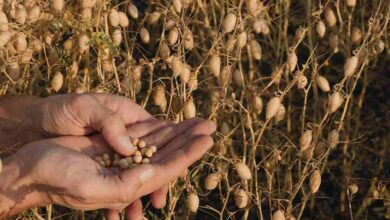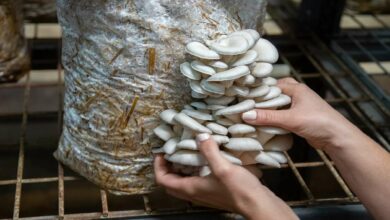Organic Mulch: Organic mulch is no less than a boon for farmers, know its benefits
Organic Mulch: In horticulture and agriculture, mulching is the practice of covering the soil to preserve its quality, productivity, and environmental sensitivity. Using organic mulch instead of plastic mulch has many advantages for the environment, the economy, and agriculture. Crop leftovers, leaves, grass, straw, coconut husk, wood bark, and compost are examples of organic mulch.

1. Advantages for the Environment
Organic mulch is environmentally friendly, in contrast to plastic mulch. The dumping of plastic mulch harms the environment since it is not biodegradable. Organic mulch enhances soil fertility and structure and is entirely biodegradable. The following are some advantages of organic mulch for the environment:
Decrease in the Amount of Plastic Garbag
Land contamination results from the difficulty of removing and destroying plastic mulch. In the environment, organic mulch degrades spontaneously.
Preservation of soil Biodiversity
By protecting the soil’s microbes and insects, organic mulch preserves the soil’s biodiversity and quality.
Keeping the Carbon Cycle in Balance
By incorporating organic materials into the soil, organic mulch helps to balance the carbon cycle.
2. A Better Grade of Soil
When it comes to enhancing the quality of soil, organic mulch is quite beneficial. It enhances the soil’s physical, chemical, and biological composition in addition to preserving soil moisture. The following are some of its advantages.
Keeping the Soil Wet
By lowering evaporation, organic mulch helps maintain soil moisture and lessens the need for irrigation.
Regulating the Temperature of the Soil
Crop roots benefit from an environment where the soil temperature is consistent due to the presence of organic mulch.
Nutrient Supply
As organic mulch breaks down, vital elements like potassium, phosphorus, and nitrogen become accessible in the soil.
Stopping Soil Erosion
Rain and wind-induced soil erosion is avoided with organic mulch.
3. Increased Yields of Crops
Crop growth and yield are positively impacted by the use of organic mulch. The following are its main advantages:
Control of Weeds
By covering the soil surface, organic mulch inhibits weed development and lessens the demand for herbicides.
Management of Disease and Pests
Beneficial bacteria are encouraged while harmful organism activity is decreased in the soil by organic mulch.
Quality of Crops
Because organic mulch contains more nutrients, it enhances crop quality and flavor.
4. Financial Gains
Farmers can afford organic mulch since it is readily accessible and reasonably priced. Here are some of its financial advantages…
Cheap
Because organic mulch is made from agricultural waste, it is less expensive to use than plastic mulch.
Long-Term Advantages
Using organic mulch improves soil fertility, which eventually results in more crops being produced.
Cutting Down on Fertilizer Use
By adding nutrients to the soil, organic mulch lessens the demand for chemical fertilizers.
5. Fit for Environmentally Friendly and Sustainable Farming
An essential component of sustainable agriculture is organic mulch. It contributes to environmental, water, and soil conservation. By ensuring the sustainable use of natural resources, organic mulch helps to preserve the equilibrium of the ecosystem.





